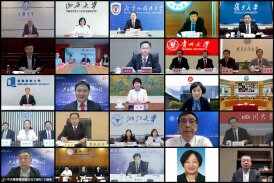
HKBU joint research wins the Best Faculty Article Award from Chinese Communication Association
An transdisciplinary team of researchers from Hong Kong Baptist University (HKBU), Arizona State University has received the Best Faculty Article Award from the Chinese Communication Association (CCA) for their article titled “Curbing profanity online: A network-based diffusion analysis of profane speech on Chinese social media”.
The study was conducted in a joint collaboration by Dr Céline Yunya Song from the Department of Journalism, HKBU, Dr. K. Hazel Kwon from Arizona State University, and Prof Jianliang Xu, Dr Xin Huang and alumna Shiying Li from the Department of Computer Science, HKBU. The research applied innovative computational methods to examine the network diffusion processes of profanity in Sina Weibo. One of their nominators, Professor Mike Yao, Head of the Charles H. Sandage Department of Advertising in the College of Media at the University of Illinois Urbana-Champaign said the study “fills a gap in current knowledge about cyber incivility by systematically examining its propagation process at the network level.”
The study fills a gap in current knowledge about cyber incivility by systematically examining its propagation process at the network level.
Professor Mike Yao
University of Illinois Urbana-Champaign
Moving beyond the widely-analyzed U.S. and European contexts, the article examined profane speeches in the Chinese social media. The study found that even though swearing posts showed a faster propagation than non-swearing posts immediately after publication, the effect did not endure for more generations of transmission. By adding a Chinese perspective, the research team successfully expanded the existing societal and policy discussions surrounding profanity, incivility, and online content moderation.
The article promotes methodological innovation and applies diffusion network analysis to the study of profanity propagation on social media. The reconstruction of complete cascade networks marks one of the most important innovations of this study, as there exists scarce research on the network structure of how profane speeches are shared among users on a mainstream social media platform. A set of innovative structural metrics were computed to measure not merely the sheer diffusion size but also more refined structural features such as depth (the penetrability of a message), width (the expansibility of a message), and interlayer width ratio (the expansion rate of the message propagation). This enabled the quantification of multiple aspects of online propagation and evaluate both the volume of virality and the generative processes of diffusion.
“This research idea was conceived when I and Dr. K. Hazel Kwon were working overseas as visiting scholars,” Dr Song shared. “We were joking: Given swearing is often viral on social media, would happy swearing be even more viral than angry swearing? Understanding the diffusion mechanism of incivility is the key to answering this question. Brainstorming ideas with the Computer Science colleagues was such a fulfilling and rewarding experience; and thanks to the strong and diverse expertise of this team, we made it.”
Prof Xu, Head of Department of Computer Science, HKBU, said, “Cross-disciplinary collaboration is essential to research innovation and academic discovery. Working with our alumna and other researchers within and outside the University has been a great experience for us, in particular, it has offered a wonderful learning experience for Shiying, and she is now working as a software engineer at Airbnb. We will continue our effort to engage in more cross-disciplinary collaborations.”
Founded in 1990, CCA is the oldest international professional society aiming to promote, enhance, and facilitate scholarly activities and exchanges on Chinese communication, which is broadly defined to embrace any aspect of communication studies concerning Mainland China, Hong Kong, Macau, Taiwan, the global Chinese diaspora, and Chinese influence overseas. The award presentation ceremony will take place in the 2022 Association for Education in Journalism and Mass Communication (AEJMC) Conference in August in Detroit, Michigan, U.S.A.



